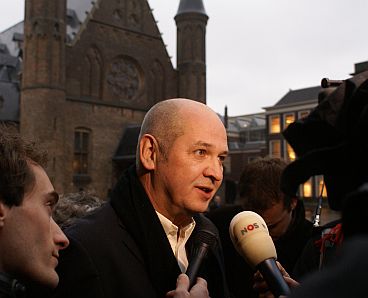SP leader Jan Marijnissen: CDA – SP cooperation unfortunately not possible
SP leader Jan Marijnissen: CDA – SP cooperation unfortunately not possible
On the basis of exploratory meetings between the 'informateur' – a neutral person appointed by the Queen to advise on the composition of a new government – and the leaders of the Christian Democrats (CDA), the Labour Party (PvdA) and the SP, it now seems unlikely that the three parties will be able to form a coalition government. Mr Rein Jan Hoekstra's conclusion after repeated talks was that the differences between, in particular, CDA and SP were too great to allow them 'to come in the short term' to an agreement enabling 'stable and fruitful cooperation'. This decision stems from the CDA's desire to take the policies of the pre-election government of Jan Peter Balkenende as its starting point, policies which it seems determined to continue. In addition, the CDA is reluctant to put itself in a position where it forms the minority of a cabinet composed of its own ministers but also those of two parties to its left, the PvdA and the SP. It is particularly unwilling to do this given the clear majority in parliament of parties favouring a change in policy.

SP leader Jan Marijnissen gave the following clarification of the current situation.
‘In my opinion,' Mr Marijnissen said, 'the voters said clearly on 22nd November that a great many things must be changed. In sum, they want more humane policies and a more “social” approach. The SP's desire to contribute to delivering such policies is undiminished. That has always been and remains our starting point. But with a premier and a party determined to stick to its previous policies – policies which we have, on a great number of fronts, fought against – it is now difficult to come to an agreement.
‘Cooperation between CDA and SP appears at the moment not to be what the CDA wants, because insufficient agreement exists between its standpoints and those of the SP. I did say before the elections that it would be very difficult to come to an accord with the CDA.
‘It's up to the informateur now to look for alternatives,' the SP leader concluded. 'Obviously other coalitions are conceivable, including coalitions in which the SP could participate.'
The difficulty in finding such a coalition arises from the lack of any clear majority of 'right' or 'left', as well as the fact that a combination of the two biggest parties, the CDA and Labour, also falls some way short of the seventy-six parliamentary seats which constitute a majority. Such a 'grand coalition of the centre', on the current German model, would need to find a third party with which to govern. A number of candidates exist, but none is unproblematic. The Christian Union, a small religious party with a reasonable social policy, had a good election, doubling its representation. Its six seats would give the centrist coalition the majority it needs. Its supporters, however, notwithstanding its relatively socially-friendly policies, may not be happy at participating in a government including Labour.
Another possible coalition partner for CDA and PvdA is the Green Left. This would, however, once again leave the CDA outnumbered by the left in its own cabinet. The centrist D66 would also make a majority, but constantly dwindling electoral support would make it an unpopular choice amongst an electorate which tends to believe that, whether big or small, parties who improve their position in an election should, where feasible, be the first to be considered when it comes to forming a government.
Another factor is the right-wing populist grouping led by dissident MP Geert Wilders. Even if the CDA could swallow his virulently anti-immigrant rhetoric, however, Mr Wilders' nine MPs, together with the twenty-two of the right-wing free-market liberals of the VVD would still not give the right a majority. Like D66, moreover, the VVD had a bad election and the feeling both inside and outside the party is that it should move into opposition.
Much, in other words, remains to be settled, and the game is far from over.
- See also:
- Dutch elections
